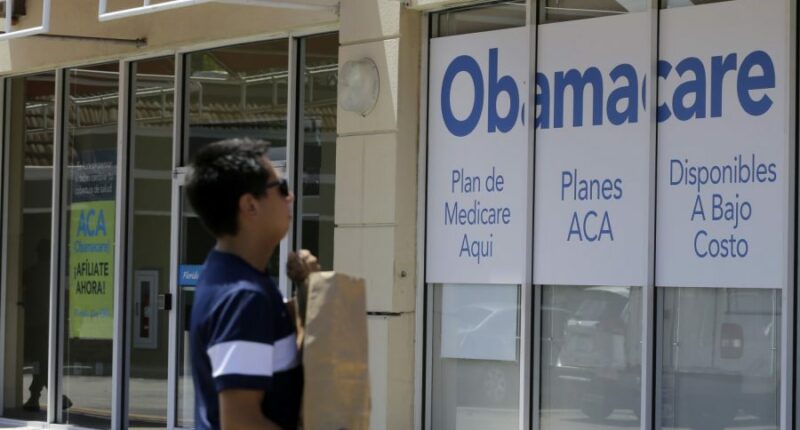Share this @internewscast.com

As Congress races against time to address the extension of crucial enhanced ObamaCare subsidies, the potential for significant public impact looms large, especially with the open-enrollment period already in motion. The pressing deadline threatens to leave many facing unexpected costs, highlighting the urgency of the situation.
Although there’s a slim chance for a breakthrough before November 1st, the likelihood of states and federal agencies managing to integrate these subsidies into their pricing structures in such a short timeframe remains dim. The Republican stance has been firm, insisting on amendments to the tax credits as a precondition for any extension, complicating the prospects of a swift resolution.
Jessica Altman, executive director of Covered California, expressed concerns over any potential policy shifts, which she believes would create additional challenges for state-level ObamaCare administrators. “If a significant policy discussion regarding marketplace affordability is to take place, it should be scheduled for 2027 coverage,” Altman advised. Such changes, she noted, would be cumbersome and disruptive if implemented too hastily.
With the ongoing government shutdown — now among the longest in history — showing no signs of resolution, the deadlock continues. Democrats are pressing for the renewal of these vital tax credits to help millions access affordable health care. However, Republicans remain steadfast, refusing to engage in health care discussions until government operations resume.
“The later it is, and the more different than it is from the structure that we have today, the longer it will take, the more burdensome it will be to marketplaces and consumers, and the more messy it will be,” she added.
There’s no sign of progress in resolving the shutdown, now the second longest in history. Democrats are demanding Republicans renew the enhanced tax credits that help make coverage more affordable for millions of Americans, but Republicans aren’t budging from their position that any talk about health care won’t happen until after the government reopens.
The law’s original subsidies will remain in place if Congress lets the enhanced version expire. But they cut off for people earning 400 percent above the poverty level — about $62,000 for an individual and $128,000 for a family of four.
There is no such cap for the enhanced credits, so premiums for people above the 400 percent threshold have been capped at no more than 8.5 percent of annual income.
Enhanced subsidies have been most popular with Americans in higher income brackets, including small business owners. If the enhanced subsidies expire, those people will have no financial help.
According to the Congressional Budget Office, nearly 4 million fewer people will have marketplace plans in a decade if the extra subsidies expire.
State insurance officials and health experts warn that the longer it takes to reach a deal to extend the enhanced tax credits — if one ever materializes — the more difficult it will be to implement any changes Republicans want.
“It’s just not an on/off switch,” said Jeanne Lambrew, a former key health adviser in the Obama administration and a former top health official in Maine. “And at this point, we’re just past the point where I think major changes to the premium tax credits could be implemented for Jan. 1.”
The Department of Health and Human Services did not answer when asked how long it would take to implement any changes to Healthcare.gov if a deal is reached after Nov. 1, or if the administration plans to do any outreach to consumers.
While the enhanced subsidies don’t expire until the end of the year, some people are already seeing the consequences if Congress doesn’t act.
Window shopping has already begun in most of the 22 states that operate their own exchanges, and the federal Healthcare.gov website will begin displaying the prices for insurance plans next week.
Idaho already started open enrollment on Oct. 15; without the tax credits, average out-of-pocket premiums are expected to rise by $1,200 a year, a 75 percent increase, according to state health officials.
In Washington state, net premiums will increase 65 percent on average for enhanced premium tax credits recipients, according to a state insurance fact sheet.
The Washington Post reported that premiums for up to 17 million Americans who buy plans on the federal Healthcare.gov website will increase 30 percent on average.
Insurers cite the expiring extra subsidies as one of the reasons they are charging higher premiums, as they anticipate healthier people will drop coverage.
Without enhanced tax credits, the percentage increase in what consumers actually pay next year will be far higher. The average marketplace consumer will pay $1,904 in annual premiums next year, according to KFF.
In California, Altman said monthly premium payments will rise 97 percent on average if there is no subsidy deal.
“I don’t really feel like I can mitigate the sticker shock, because the sticker shock is real right now,” said Altman of Covered California. People will decide to go without insurance coverage, and even if there’s a subsidy deal, some won’t come back, she added.
“We will do everything that we can, and I believe we will get a lot of people back, or keep a lot of people covered,” Altman said. “But I also know it won’t be everyone, and it will be fewer people that we get back the longer this goes.”
Democrats, state officials and health industry stakeholders urged Congress to extend the enhanced subsidies as early as possible.
“Republicans have had all year to get serious about health care. Instead they focused on tax cuts for billionaires and they did not tell them to wait for new tax breaks. Now they are forcing working families to wait until those devastating price hikes are unavoidable,” Sen. Patty Murray (D-Wash.) said.
When Republicans chose not to include a subsidy extension as part of their party-line tax cut bill over the summer, those efforts shifted to including them in a government funding deal.
“We’ve been saying this for over a year, that the earlier the decision could be made, the more certainty we would have, the more stability for the market,” Devon Trolley, executive director of Pennsylvania’s insurance exchange, told The Hill in an interview earlier this month.
Congress could attempt to pass a “clean” extension for 2026 and have any changes take effect in 2027, but it’s not clear if enough lawmakers in either party would support the effort. Separate bills have been introduced in the House and Senate that would implement either one- or two-year extensions without policy changes.
But Republicans are divided over whether to extend the subsidies at all.
Some battleground members have urged GOP leadership to make negotiations a priority, but only once the government reopens. Others publicly say they don’t want to help Democrats fix the Affordable Care Act and would prefer to let the subsidies expire.
Republicans have discussed capping eligibility for the enhanced subsidies at a certain income level, and requiring recipients to make a minimum premium payment to discourage what they say are millions of “phantom enrollees” who were enrolled without their knowledge by fraudulent brokers.
They also have entertained ending the subsidies for new enrollees, but grandfathering in people who already receive them.
Senate Majority Leader John Thune (R-S.D.) laid out the GOP argument in a Thursday interview with conservative commentator Ben Shapiro.
“They [the enhanced subsidies] didn’t have an income limit. … They have zero-premium policies, so people don’t even know they’re covered. Insurance companies are incentivized to auto-enroll people, and so it’s become a money maker factory for insurance companies,” Thune said.
A further complication could be if Republicans insist on adding language to prevent the subsidies from funding elective abortions.
Democrats say it’s a nonstarter, and accuse Republicans of bad-faith efforts to expand abortion restrictions. Federal law already prohibits taxpayer funds from going to abortion services, and the Affordable Care Act requires federal funds to be separated from abortion coverage.












